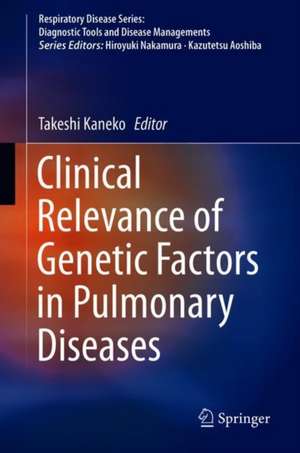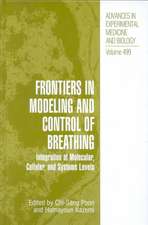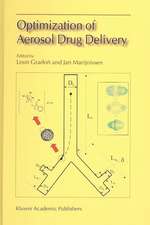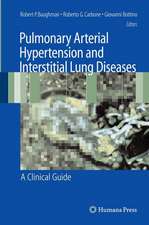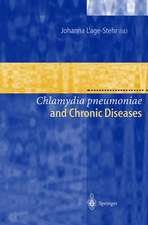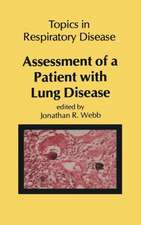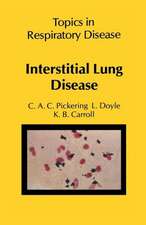Clinical Relevance of Genetic Factors in Pulmonary Diseases: Respiratory Disease Series: Diagnostic Tools and Disease Managements
Editat de Takeshi Kanekoen Limba Engleză Hardback – 25 iul 2018
This volume of the Respiratory Disease Series – Diagnostic Tools and Disease Managements will broaden the understanding of beginning and experienced researchers and clinicians who treat pulmonary diseases. Moreover, residents and clinicians engaged in medical oncology will find it a valuable guide to support them in their day-to-day work.
| Toate formatele și edițiile | Preț | Express |
|---|---|---|
| Paperback (1) | 961.35 lei 38-45 zile | |
| Springer Nature Singapore – 26 dec 2018 | 961.35 lei 38-45 zile | |
| Hardback (1) | 662.03 lei 38-45 zile | |
| Springer Nature Singapore – 25 iul 2018 | 662.03 lei 38-45 zile |
Preț: 662.03 lei
Preț vechi: 696.86 lei
-5% Nou
Puncte Express: 993
Preț estimativ în valută:
126.69€ • 132.10$ • 105.29£
126.69€ • 132.10$ • 105.29£
Carte tipărită la comandă
Livrare economică 17-24 martie
Preluare comenzi: 021 569.72.76
Specificații
ISBN-13: 9789811081439
ISBN-10: 9811081433
Pagini: 340
Ilustrații: IX, 344 p. 55 illus., 36 illus. in color.
Dimensiuni: 155 x 235 mm
Greutate: 0.59 kg
Ediția:1st ed. 2018
Editura: Springer Nature Singapore
Colecția Springer
Seria Respiratory Disease Series: Diagnostic Tools and Disease Managements
Locul publicării:Singapore, Singapore
ISBN-10: 9811081433
Pagini: 340
Ilustrații: IX, 344 p. 55 illus., 36 illus. in color.
Dimensiuni: 155 x 235 mm
Greutate: 0.59 kg
Ediția:1st ed. 2018
Editura: Springer Nature Singapore
Colecția Springer
Seria Respiratory Disease Series: Diagnostic Tools and Disease Managements
Locul publicării:Singapore, Singapore
Cuprins
Part I Introduction.- 1. Clinical development of genomic medicine in pulmonary diseases: Are genetic factors enough to determine the phenotype and inheritance of pulmonary diseases?.- 2. Statistical approaches and strategies for complex diseases - Overview - : What is the rationale for the genome-wide approach to understand complex diseases - its application and limitations.- Part II Genetic Disorders in Pulmonary Disease.- 3 (旧4)Bronchial asthma: Is asthma inherited?.- 4 (旧5)COPD - Hereditary (A1-AT) and Non-hereditary: What are the roles of genetic factors in the pathogenesis of COPD?.- 5 (旧3)Smoking behavior and cessation (nicotine addiction): Are genetic factors involved in smoking behavior?.- 6. Cystic fibrosis, Primary ciliary dyskinesia and Diffuse panbronchiolitis - Hereditary and Non-Hereditary: What are the roles of genetic factors in the pathogenesis of these diseases?.- 7. Pulmonary Fibrosis -Hereditary and Nonhereditary: What are the role of genetic factors in the pathogenesis of pulmonary fibrosis? .- 8. Other diffuse lung diseases - Diffuse cystic lung diseases (LAM, TSC, BHD), Sarcoidosis, Pulmonary alveolar proteinosis, and Pulmonary alveolar microlithiasis: What are the roles of genetic factors in the pathogenesis of these diseases?.- 9. Pulmonary vascular diseases - Pulmonary hypertension and HHT: What are the roles of genetic factors in the pathogenesis of pulmonary vascular diseases?.- 10. Mycobacterial infection – TB and NTM: What are the roles of genetic factors in the pathogenesis of mycobacterial infection? .- 11. Pulmonary malignancies (1): Lung cancer: What are the roles of genetic factors in lung cancer pathogenesis?.- 12. Pulmonary malignancies (2): Mesothelioma: What are the Roles of Genetic Factors in the Pathogenesis of Mesothelioma?.- 13. Genetic Factors in Sleep Disorders: What are the roles of genetic factors in the pathogenesis of sleep disorders?.- 14. Pharmacokinetics, pharmacodynamics, and toxicities: What should we know about genetic factors that affect the pharmacotherapy of pulmonary diseases?.- Part III Oncogenic Driver Mutation (Somatic Mutations) in Lung Cancer.- 15. EGFR: How important is EGFR mutation status in the management of lung cancer?.- 16. ALK, and others: How important are ALK, and other mutations in the management of lung cancer?.- Part IV Current Topics.- 17.Application of high-throughput technologies in personal genomics: How is the progress in personal genome service?.- 18. Nucleic acid amplification-based diagnostics for pulmonary diseases : What is the current state and perspectives of nucleic acid amplification technologies used in diagnostics associated with pulmonary diseases?.
Notă biografică
Hiroyuki Nakamura,
Department of Respiratory Medicine,
Tokyo Medical University, Ibaraki Medical Center,
Ibaraki,
Japan
Kazutetsu Aoshiba,
Kazutetsu Aoshiba,
Department of Respiratory Medicine,
Tokyo Medical University, Ibaraki Medical Center,
Ibaraki,
Japan
Takeshi Kaneko,
Department of Pulmonology,
Yokohama City University Graduate School of Medicine,
Yokohama,
Japan
Textul de pe ultima copertă
This book describes the underlying genetic basis of common pulmonary diseases and discusses their pathogenesis and pathophysiology. These insights provide the basis for understanding different subtypes and phonotypes, and will promote better treatment strategies and individualized medicine. The book provides new and valuable information for the development of the areas of study, as well as practical guidelines for clinicians engaged in treating pulmonary diseases.
This volume of the Respiratory Disease Series – Diagnostic Tools and Disease Managements will broaden the understanding of beginning and experienced researchers and clinicians who treat pulmonary diseases. Moreover, residents and clinicians engaged in medical oncology will find it a valuable guide to support them in their day-to-day work.
This volume of the Respiratory Disease Series – Diagnostic Tools and Disease Managements will broaden the understanding of beginning and experienced researchers and clinicians who treat pulmonary diseases. Moreover, residents and clinicians engaged in medical oncology will find it a valuable guide to support them in their day-to-day work.
Caracteristici
Describes the underlying genetic basis of common pulmonary diseases and discusses their pathogenesis and pathophysiology Provide an essential basis for understanding different subtypes and phonotypes Broadens the understanding of beginning and experienced researchers and clinicians engaged in the treatment of pulmonary diseases
